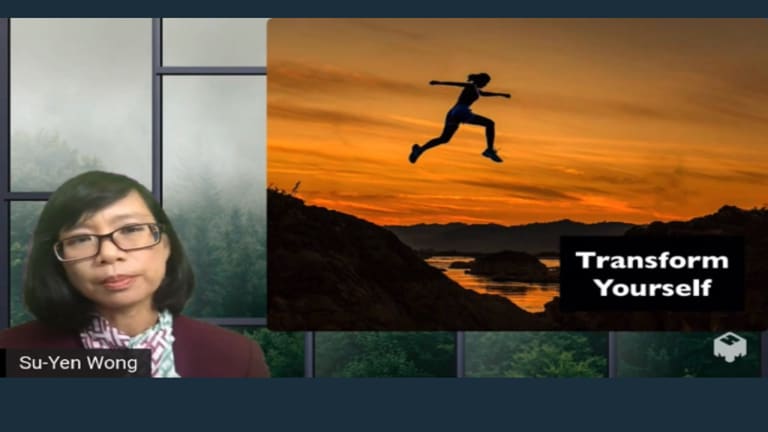
Reinventing yourself for the Future of Work: Learn, work, and play in tandem
Technology#Perspectives2021#FutureOfWork
With the onset of the 4th industrial revolution, new business models and jobs are being created, and destroyed, at a dizzying pace. Given the inevitability and pace of change, reinvention is critical to thriving in the future of work. But what are the key principles to focus on while reinventing yourself for the future of work?
In an interesting session at Perspectives 2021, Su-Yen Wong, Founder & CEO Bronze Phoenix, shed light on key trends shaping the future of work at the intersection of technology and people; how to challenge your thinking around what it takes to reinvent yourself in the future of work, and to discover actionable tips that you can apply to your own reinvention journey.
It’s easy to be stuck in denial but change can occur in an instant
Change has been a constant since the industrial revolution. But the rate of change is so fast today that some of the jobs that were expected to be created in 2030 have already been created today. However, the fundamental philosophy around work has remained same, which involves bringing a large group of people in a centralized location in a quasi-production line structure, be it the office or the factory. This however was again disrupted by the COVID-19 pandemic.
Hence, just like the five stages of grief, it’s easy to be stuck in denial but change can occur in an instant. And this is what we need to accept even though as humans. All product/business cycles have a time period, which start with the period of value inflow, stability and then decline. Typical business cycles which used to run from 20-100 years have now compressed into 5-7 years, due to the impact of technology. All this can be disorienting and we as a species are more likely to retreat to the familiar than see the possibilities.
In 1930s, economist John Maynard Keynes, who tried to imagine what work would look like in 2030, had forecasted that as technology improved, in 100 years, humans would have solved the economic problem of subsistence. Keynes predicted that we would be working three-hour shifts, five days a week and had raised the notion of technological employment at that time.
But while technology does substitute labour and displace jobs, it also creates new jobs at an astounding pace. So even if you are at the top of the heap, there will come a time when you will have to reinvent. So how can you reinvent yourself for the future?
Learn, work, and play in tandem
In parallel with the advances in technology and the shrinking business cycles, we are seeing a growth in our global life expectancy. Today, even a company on the S&P 500 index has an average life span of only 20 years compared to 60 years earlier in the 1960s. Earlier business life cycles exceeded life spans. However today, while business cycles are shrinking, life expectancy is rising globally.
So how do we make this increased life expectancy a blessing and not a curse?
The postindustrial model of work was about learning, working and playing in sequence-i.e. studying, working, and retiring. But today our skills need to be replenished on an ongoing basis. The old paradigm no longer holds. Today it is about putting them all together. So the first key insight to reinventing work is to understand the need to reconfigure work and life balance and learning, working and playing in tandem all the time. So focus not only on the job you have today but in developing the skills you would require for the job tomorrow equally. So reinventing yourself for the future requires reconfiguring work and life- a change in rhythm. The pandemic has simply accelerated it.
Reinvention requires a Growth Mindset
Secondly, in this long journey of learning and reinventing, in order to reach our full potential, we should make sure we are not hamstrung by our beliefs about ourselves and others. Reinvention requires a growth mindset.
The famous example of Rusty Justice challenging Michael Bloomberg’s notion of “You’re not going to teach a coal miner to code” by teaching coding to miners and employing them in digital solutions company BitSource is an example of how you can nurture talent that’s not immediately obvious.
Hence, in order to thrive in the future of work, we need to transform ourselves by challenging stereotypes and pushing past perceptions of what we can or cannot do or what other people might and might not be able to do. We need to get past limiting beliefs while fostering a growth mindset.
Find your tribe, Stay the course
Reinvention is not easy. So find your tribe when moving into unfamiliar territory and when going through reinvention. Get a guide or a support system which can help you persevere in the journey, stay motivated, and keep you going.
Transformation is difficult. The journey requires learning, unlearning, and relearning all the time. It is easy to get confused but stay the course. Remember that strong foundations take time to build. While nothing much seems to happen in the short term but stay consistent and over the months, you will see progress. Hence stay the course.







 Shweta Modgil
Shweta Modgil







